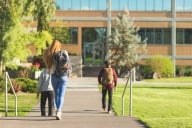You have /5 articles left.
Sign up for a free account or log in.
Georgetown University was the first Roman Catholic college to have a full-time rabbi as a chaplain to serve Jewish students. It also has a full-time imam to serve Muslim students, and has historically been praised for promoting Catholic teachings while welcoming people of many faiths.
As the academic year starts, however, Georgetown is the site of Protestant religious strife. The university's Protestant ministry has told six evangelical groups that the university's relationships with them have been "terminated." The groups will not be allowed to organize worship services, retreats or Bible study, or to participate in the annual open house designed to introduce Georgetown students to various groups. The evangelical groups were also told that they must revise their Web sites so that no Georgetown relationship is implied, and avoid any public statement that they have a ministry at the university.
In a letter to the evangelical groups, Rev. Constance C. Wheeler, the Protestant chaplain at Georgetown, did not offer any reason for the decision, but said that it came "only after much dialogue with the Lord." University officials characterized the decision as an administrative one, designed largely to ensure better coordination of services for Protestant students.
Kevin Offner, who works with the InterVarsity Christian Fellowship at Washington-area colleges, said that the expulsion followed growing tensions among Protestant groups. InterVarsity is one of the groups that is being forced off the Georgetown campus.
Offner said that as a condition of operating on campus, InterVarsity has had to sign "covenant agreements" pledging not to proselytize, agreeing to have staff members attend joint Protestant religious services, and expressing respect for the Catholic faith as a legitimate path to God. InterVarsity and the other groups have signed those pledges and followed their letter and spirit, Offner said, even though not all evangelical people would agree with that approach.
The problem, he said, is that the mainstream Protestant services Georgetown provides do not meet the needs of all students. When Offner attended joint Protestant services as required by the agreement, he said he brought a few students so they could participate. His students were not helped or fulfilled by the services, he said.
"It's not the our students hate [the official Protestant chaplains]. This just isn't how they want to worship, and we don't all worship the same way," he said.
InterVarsity and other evangelical groups have of late been involved in a series of disputes over whether public universities should recognize them as official student groups. Some public universities have objected to doing so, citing the groups' religious requirements and bans on participation for gay students, among others. But the religious groups have been fighting back in court, saying that denying them access amounts to a violation of their rights.
As a private, religious university, Georgetown has wide latitude to decide which groups it wants to recognize, and Offner said that he didn't know if the evangelical groups have any legal recourse. But he said he wanted to frame the issue as one of "false advertising." Georgetown "encourages students to come for the diversity and we provide an evangelical diversity and we're not welcome," he said.
Erik Smulson, a spokesman for Georgetown, said that the changes were "administrative" and based on "coordinating and communications issues," not any desire to control students' religious observance. He noted that Georgetown is an open campus where students and their guests are largely free to come and go and meet with whom they want.
The motivation for excluding the evangelical groups, Smulson said, comes from "a desire in the Protestant chaplaincy to build the ministry from within Georgetown and its Protestant student leaders rather than rely on outside groups or fellowships." He said that officials hoped that by having a single Protestant ministry, the university would have "a more consistent and focused effort" for students.








